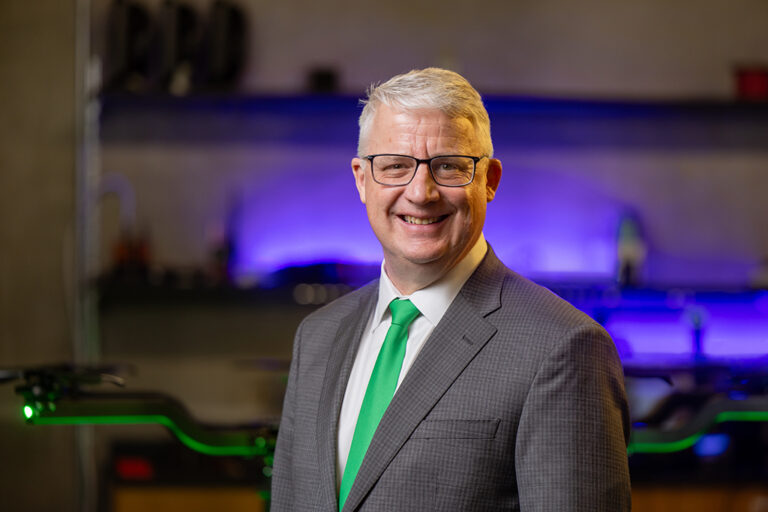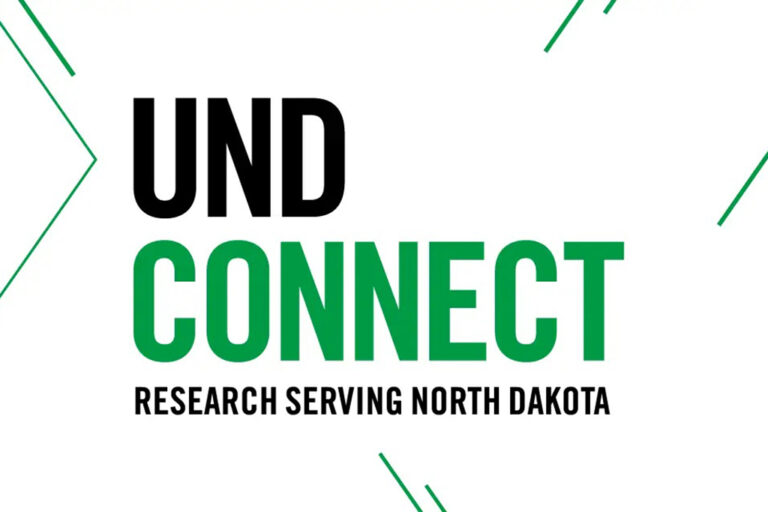Seeds sown, research grown
Seed funding programs provide nearly $3 million to propel UND research community efforts

The University of North Dakota is a relatively small institution, but it’s building a big reputation.
Last fall, UND was voted one of the top 25 most innovative schools in the country, in a peer survey conducted by U.S. News & World Report. Much of that innovation is brought to life by the University’s research community, and UND is making substantial investments in stoking that creative fire.

In fiscal years 2017 and 2018, seed programs supported through the UND Office of Research & Economic Development and its partners have awarded researchers and scholars an incredible $2,820,000 in funding to ignite their important work.
It’s all a part of the plan for research excellence.
Goal Four of UND’s Strategic Plan is working toward a 2022 metric of roughly $120 million in internal and external research funding. And, according to Vice President for Research & Economic Development (VPRED) Grant McGimpsey, the hunt for external federal funding is difficult and highly competitive among the country’s research universities.
“One way that universities our size can compete is to offer internal funds that can help kick start some internal research that will get us to the point of being contenders for those large federal grants,” he said, adding that it’s encouraging that UND is investing in research at a time at which budgets are constrained. “It reaffirms the University’s commitment to its identity as a research university.”
University of North Dakota President Mark Kennedy agreed, asserting, “These investments strengthen UND’s capabilities to be the chief opportunity engine for our state and students.”
Planting many seeds
The Office of Research – with help from the Alumni Association & Foundation (AA&F) and funding matches from UND Aerospace, Arts & Sciences, Engineering & Mines, and Medicine & Health Sciences – has established three distinct seed programs.
Two years ago it began the Postdoctoral Research Program and Early Career Award Program, funding researchers to hire postdocs and helping pre-tenured faculty build their research and scholarship portfolios.
Those seed programs continued this year, with the addition of a new Grand Challenge-specific series to support society-enhancing research in the areas of medicine, energy, rural communities and unmanned and autonomous systems.
“We’ve tilted the call a little more toward ideas that involve multiple disciplines and multiple faculty, in a way that generates collaboration,” McGimpsey said.
Tailored solutions
The VPRED team worked with each of the Grand Challenge champions to tailor the seed initiatives to be most effective in their respective enterprises.


“Each one was different,” said John Mihelich, faculty fellow for research and professor of anthropology. “Grant asked them to put their heads together with their teams to see what would make sense for them. They came back with great ideas.”
Mihelich explained that for biomedicine, the seed program was specific to seeking large National Institutes of Health grants, so the awards were fewer, but bigger.
“The program has already helped to initiate some very innovative, multi-discipline collaborations that have a high likelihood of successfully competing for extramural funding next fall,” said Colin Combs, biomedicine chair and Grand Challenge champion.
In the case of rural communities, UAS, and energy, smaller awards were given to increase the breadth of research opportunities.
Tom Erickson, CEO of the Energy & Environmental Research Center and champion of the energy Grand Challenge, says his recipients are using the funds to develop white papers to spark interest from external funding sources and University collaborators.
“We had tremendous interest from the very beginning in the submitted proposals,” Erickson said. “And for those who were selected, there’s high interest in how they can take this and move it on even beyond this white paper initiative. That’s where you really get to see the excitement.”
The excitement is spreading. More than 150 seed fund proposals have been submitted to the VPRED over the past two years.
Mark Askelson, interim executive director of the UND Research Institute for Autonomous Systems and champion of the UAS Grand Challenge, said the response to his seed funding call was outstanding, with 18 proposals that organically bridged several UND colleges and research areas.
“As we move forward, we want to pollinate bigger research efforts that involve multiple Grand Challenges,” Askelson said. “We already have some of that, but we want to stimulate that even more.”
Champion of the Grand Challenge addressing rural health and social problems, Thomasine Heitkamp, is currently working to expand access to training and technical assistance to address the opioid epidemic. Now, she says she’s confident her entire Grand Challenge team is gaining momentum – thanks in part to seed funding.
“The recipients have begun work on their projects and many are pursuing other revenue streams to continue their efforts more robustly,” Heitkamp said. “This includes myriad projects examining oral health, breastfeeding, rural ER visits, research capacity in tribal communities and online tribal court advocacy.”
Computational power
Underlying the forward movement of the Grand Challenges is the growing need to create, store and analyze big data – the foundation of the fifth Grand Challenge – and UND has invested $910,000 over the past year to meet those data needs.
“We have to have the infrastructure in place – the computational infrastructure, the data storage infrastructure, the electricity and the bandwidth,” McGimpsey explained. “All of these enabling pieces will allow these research areas to be more successful.”
The initial funding has put in place the cores, nodes, and terabytes necessary for baseline research support, but McGimpsey says big data is a “multiple-step build” that will require more data experts on campus.
“This will bring us to a level of infrastructure that will allow us to attract more people to come to create and use the data, and then they will inform further building,” he said.
Continued harvest
These investments are just the beginning.
With a plan to more pointedly communicate the engaging and state-serving research that’s happening at UND, the office of the VPRED hopes to work even more closely with the AA&F and UND colleges to garner donor support and offer even more internal funding
“The most exciting part isn’t giving out these awards – it’s seeing how many actually wrote proposals to win these dollars,” McGimpsey added. “It’s great to be at a place where people are enthusiastic about research.”


